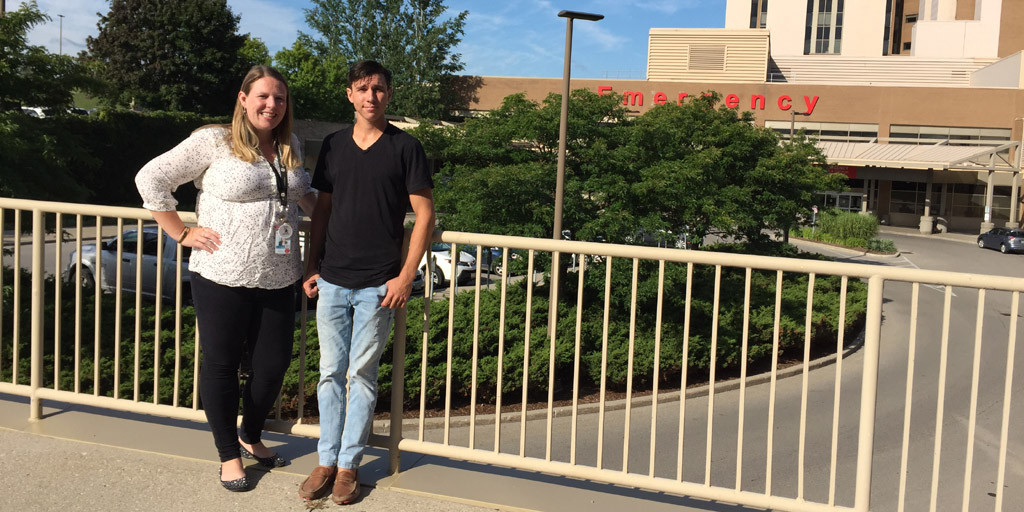LHSC: Stay safe, don't step over the "stupid line"
 CREDIT: KATHY LEBLANC
CREDIT: KATHY LEBLANCJane Edwards (left) and trauma patient Cole Liley (right) stand together in front of the London Health Sciences Centre (LHSC) at the Victoria Hospital. They want to remind students to know how to make the right decision when facing the "stupid line".
As the months of fall come rolling around, returning students want a last ‘hooray’ to end the summer vacation before classes and workload start to pick up.
This means parties may take place where there will be alcohol, dancing, friends and other distractions to keep your mind from making the right choices – choices that may do traumatic harm to you or others.
According to an Aug. 30 press release from London Health Sciences Centre (LHSC), September to October is the prime time for traumatic injuries, particularly for youth ages 16 to 24.
The LHSC injury prevention program is reminding post-secondary students to be aware of the “stupid line”, which is the boundary between being smart and taking a risk.
With the influx of students coming in fall, Jane Edwards, injury prevention specialist for LHSC, wants them to stay safe while having fun.
“We really want people to take a pause and think about the decisions they are making on a day-to-day basis, especially on the weekends when they are out having a good time. [They need to] think about the consequences of the actions they take. We recognize that everyone wants to have a good time, but we want them to be safe at the same time,” Edwards said.
Past trauma patient Cole Liley, 23, crossed the “stupid line” when he attempted to climb down a balcony and the railing broke. He sustained serious injuries after plummeting to the ground. He has since recovered and is back to climbing trees for his job as an arborist.
After the incident Liley learned that taking a pause to think about the choices you make will, in the end, keep you out of harm’s way.
“I try to tell people that [doing something dangerous] is not a good idea and that something can happen really quick. I just try to tell people to make smarter choices that if there is a possibility where you could be injured, then don’t do it. Make a wiser choice,” Liley said.
Edwards also recommended that people should try to take a moment to think about the consequences an action will have on you and those around you.
“The consequences are not just for yourself. Injuries can be life changing for you, but also for your family and friends. Think about whether ‘I can make a better choice?’ We also recommend students, as well as everybody else you are going out having a good time [with] to have a good plan. How are you getting home? Who’s around you? What’s your environment like? Doesn’t matter if you are at a concert or a party. Make sure you are looking out for one another. We can all take care and be as safe as possible,” Edwards said.
When asked about what to do to help others around you stay on the safe side of the “stupid line” Edwards explained that speaking up can help save lives, but that many have trouble doing so.
“If you see someone doing something that you think is crossing the “line” that is putting them or somebody else at risk, it’s okay to speak up. We hear a lot of, ‘well I don’t want to get in trouble,’ but really getting in trouble with mom or dad or having a police officer come speak to you is way better than ending up in our trauma room unconscious. With the life changing injuries that can occur that we’ve seen here at LHSC, having a conversation, as hard as it can be in the moment, can change and save somebody’s life. So it’s important to think it through,” Edwards said.














